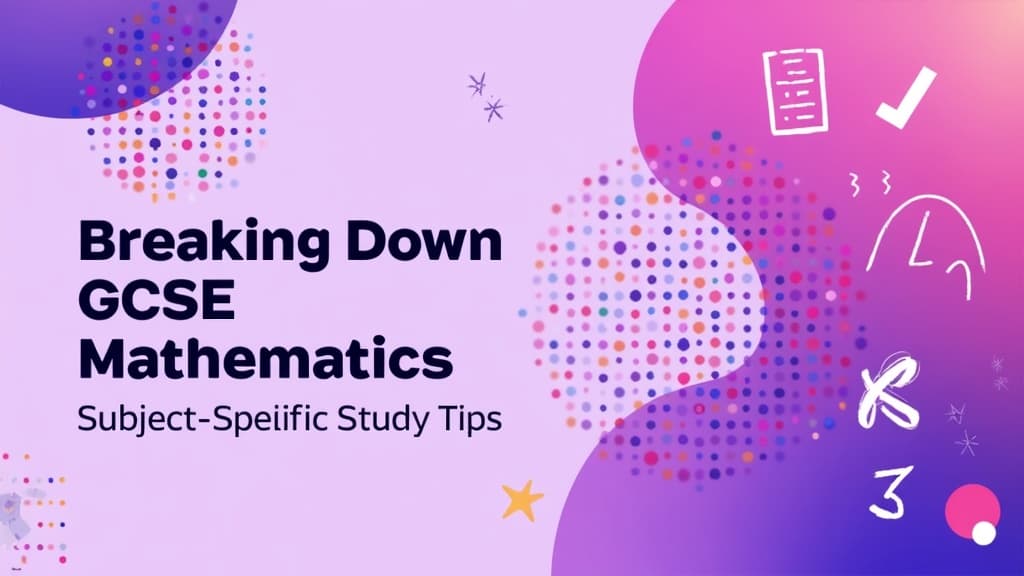
Introduction
GCSE Mathematics can be a daunting subject for many students. With a wide range of topics, complex problem-solving techniques, and the pressure of exams looming, it’s no wonder that students often feel overwhelmed. However, with effective maths revision strategies and a solid study plan, you can conquer this subject and achieve the grades you desire. This blog post will break down GCSE Mathematics into manageable parts, offering practical tips and actionable advice to help you prepare for your exams effectively. Whether you are studying for GCSE Maths in Year 10 or 11, or you’re in the middle of your A-Level studies, these tips will guide you toward success.
Understanding the GCSE Mathematics Syllabus
Before diving into study methods, it's crucial to understand the syllabus. The GCSE Mathematics curriculum is divided into several key areas:
Number
- Basic operations: Addition, subtraction, multiplication, and division.
- Fractions, decimals, and percentages: Understanding their relationships and conversions.
- Ratio and proportion: Solving problems involving ratios and direct/indirect proportions.
Algebra
- Expressions and equations: Solving linear equations, understanding polynomials, and simplifying expressions.
- Graphs: Plotting and interpreting linear and quadratic graphs.
- Sequences: Identifying patterns and working with arithmetic and geometric sequences.
Geometry and Measures
- Properties of shapes: Understanding angles, triangles, and circles.
- Measurement: Converting between different units and calculating area, volume, and perimeter.
Statistics and Probability
- Data representation: Understanding how to collect, analyse, and present data.
- Probability: Calculating the likelihood of events occurring.
Familiarising yourself with these topics will help you create a focused study plan.
Effective Maths Revision Strategies
Now that you have a grasp of the syllabus, let’s explore some effective maths revision strategies.
Create a Study Schedule
- Set clear goals: Identify what topics you need to focus on and create specific, measurable goals.
- Allocate time: Dedicate time each week to study different topics. Balance your schedule to avoid cramming.
- Use a planner: A physical planner or digital calendar can help keep you on track. Include deadlines for practice tests and revision sessions.
Use Active Learning Techniques
Active learning is more effective than passive reading. Here are some techniques:
- Practice problems: Solve a variety of problems to reinforce your understanding.
- Teach someone else: Explaining concepts to a peer can solidify your knowledge.
- Flashcards: Create flashcards for formulas, definitions, and key concepts. This method is particularly useful for memorisation.
Incorporate Past Papers into Your Revision
Past exam papers are invaluable resources for GCSE exam prep. Here’s how to use them effectively:
- Familiarise yourself with the exam format: Understanding the structure of questions can help reduce anxiety on exam day.
- Timed practice: Simulate exam conditions by timing yourself while completing past papers.
- Mark your work: Use marking schemes to identify areas for improvement. Focus on questions you find challenging.
Online Resources and Tools
Utilising online resources can enhance your understanding:
- StudentNotes.co.uk: This platform offers comprehensive notes and resources tailored for GCSE subjects. It’s an excellent tool for supplementary learning.
- YouTube tutorials: Channels dedicated to GCSE Maths can provide visual explanations for complex topics.
- Maths apps: Consider downloading apps like Mathway or Photomath to help with problem-solving.
Exam Techniques and Tips
As you approach the exam, focus on techniques that can help you perform your best.
Time Management in the Exam
- Read instructions carefully: Misunderstanding a question can lead to losing marks.
- Allocate time per question: Stick to a time limit for each question to ensure you can complete the paper.
- Move on if stuck: If you find a question particularly challenging, move on and come back to it later.
Answering Techniques
- Show your workings: Even if you arrive at the wrong answer, showing your calculations can earn you partial credit.
- Check your answers: If time permits, review your answers, especially for calculation questions.
- Use estimation: Estimating answers can help you quickly eliminate incorrect options on multiple-choice questions.
Building Confidence Before the Exam
Confidence plays a significant role in exam performance. Here are ways to build yours:
- Mock exams: Take mock exams under real conditions to build familiarity and reduce anxiety.
- Positive affirmations: Remind yourself of your capabilities and past successes in maths.
- Healthy habits: Maintain a balanced diet, exercise, and ensure adequate sleep leading up to the exam.
Conclusion
GCSE Mathematics may seem overwhelming, but with the right strategies and a focused approach, you can excel in your exams. Remember to create a structured study plan, practice actively, utilise available resources, and manage your exam time wisely. By implementing these tips, you will not only improve your understanding of maths but also build the confidence needed to succeed. For additional support, consider exploring resources like StudentNotes.co.uk, where you can find tailored materials to assist in your GCSE Maths preparation. With dedication and the right tools, you're well on your way to achieving your desired grades in GCSE Mathematics!
Key Takeaways
- Understand the GCSE syllabus and key topics.
- Create a structured study schedule with clear goals.
- Use active learning techniques and practice past papers.
- Focus on exam techniques and timed practices.
- Build confidence with mock exams and positive habits.
By following these steps, you'll be on your way to acing your GCSE Mathematics!
Want to Study Smarter, Not Harder?
Join 1,000+ students using AI to ace their exams
Sign up free and transform your study materials into comprehensive notes, flashcards, and quizzes in seconds
AI-Powered Notes
10 free generations every month
Any Format Supported
PDFs, Word, YouTube, and more
Instant Flashcards
AI-generated Q&A for revision
Progress Tracking
Gamified achievements & streaks
✓ No credit card required • ✓ Free forever plan • ✓ Cancel anytime
StudentNotes Team
Passionate about helping students achieve their academic goals through effective study techniques and AI-powered learning tools.